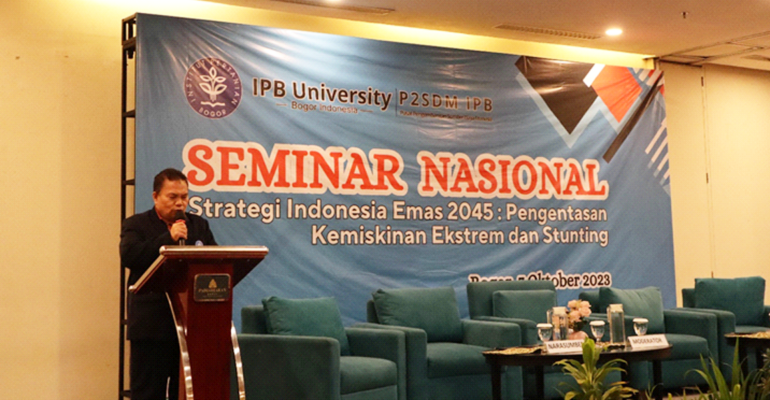IPB University Reviews Strategies for Eradicating Extreme Poverty and Stunting Towards an Indonesia Emas 2045

The Centre for Human Resource Development (P2SDM) of IPB University held a national seminar discussing strategies to alleviate extreme poverty and stunting towards the Indonesia Emas 2045. The seminar was held at Padjajaran Hotel, Bogor, West Java, recently.
Dr Amiruddin Saleh, Chief of P2SDM IPB University said, the most important development must begin with improving the quality of human resources. According to him, the Indonesian nation has good potential to start the journey towards the Indonesia Emas 2045. However, this potential can turn into a disaster if it cannot be utilised optimally.
“Extreme poverty and stunting need to be considered so that Indonesia can get a demographic bonus that can be enjoyed by various groups. Diseases such as malnutrition, mental retardation, and low learning ability will be very dangerous if affected by children. That is the main purpose of this seminar, which is to find solutions to the problems of extreme poverty and stunting,” he said.
Rector of IPB University, Prof Arif Satria on that occasion explained, that one of the responsibilities in development in Indonesia is to overcome poverty. He said that poverty is divided into two, namely absolute poverty and relative poverty. Relative poverty can threaten economic stability, while absolute poverty is not always related to capital, but also related to nutrition.
“The government has been very serious in addressing the problem of stunting so that poverty can decrease. Stunting can also be overcome by food diversification so that dependence can be lost on one food supplier, namely rice,” he said.
In addition, he said, the government is also obliged to collaborate with universities in providing the highest educational opportunities for the poor, so that poverty and stunting can be reduced from the smallest level, namely the family.
Dr Suprayoga Hadi, Vice Chairperson of the Stunting Reduction Acceleration Team (TPPS) for Advocacy and Leadership, reported that extreme poverty in March 2023 reached 1.12 percent. It is estimated that in 2024 the figure will decrease again to 0.3 percent.
“Extreme poverty is not stagnant because there is moving-in and moving-out caused by factors that cause poverty. Extreme poverty can cause an increase in the stunting rate, so it needs to be prevented from the causes of extreme poverty,” he said.
According to him, a number of challenges still occur in efforts to accelerate stunting reduction. These challenges include collaboration, coordination between stakeholders, commitment, strengthening the system, convergence, and quality in handling stunting. (Arm/Rz) (IAAS/RUM)



